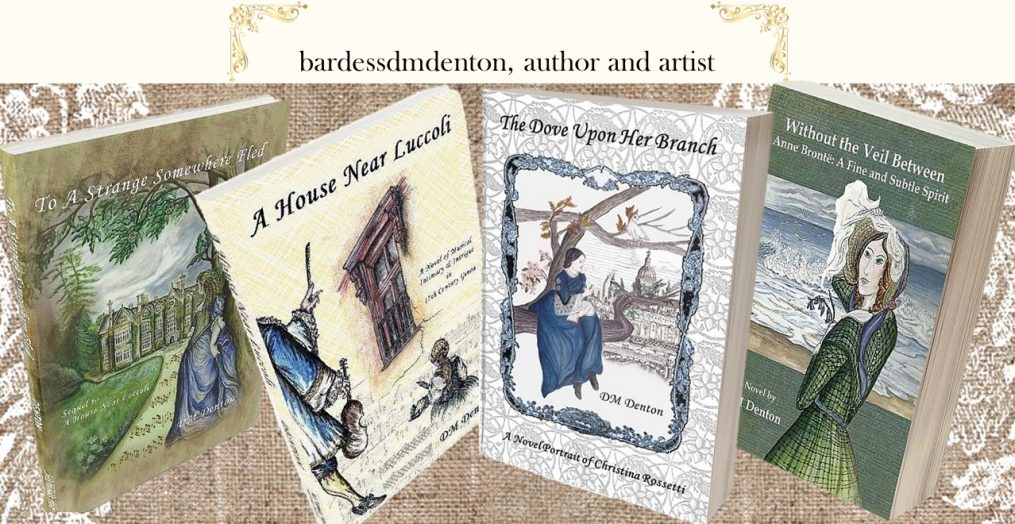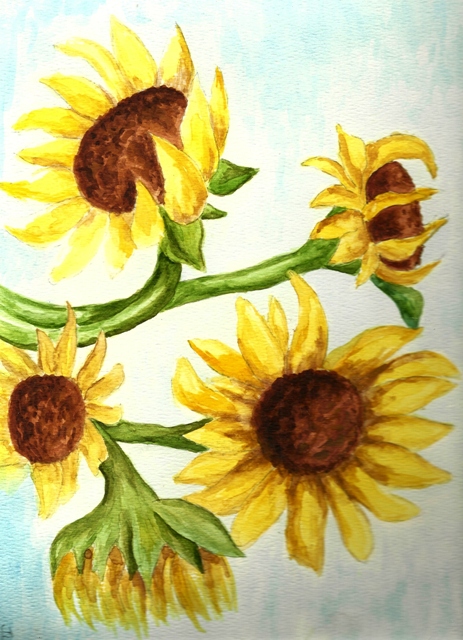June 26, 2017 marks the 200th anniversary of the birth of Branwell Brontë in Thornton, Bradford, Yorkshire.
Branwell was sullenly histrionic. To Anne he was a quivering fledgling bird: humped over, swaying, biting his lips, adjusting his glasses or picking at his chin when he wasn’t rubbing his hands. To his own satisfaction, he looked every bit the doomed artistic type. With Mr. Robinson there he became more nervous with any attention Mrs. Robinson showed him, and struggled to contain his anger when her husband was less than civil to her. More than once Anne hooked her brother’s arm and held him back from acting as wasn’t his place to. © 2017 by DM Denton

Of course, he makes many appearances and is an integral character in my upcoming novel focusing on and from the viewpoint of his youngest sister, Without the Veil Between, Anne Brontë: A Fine and Subtle Spirit.
(As) Anne … weaves her gentle spirit into dealing with the dissolution of her brother, her father’s loving distraction, and her two sisters’ determination to overcome the limitations of their sex in Victorian society, the reader gets a sense of how genius rose out of the tensions, love, and straining within the family itself. ~ from pre-publication review by Thomas Davis, Four Window Press, author of The Weirding Storm, an epic poem
Here’s another Branwell-related excerpt from Without the Veil Between (yet to go through its final edits):
“I thought you would have gone to the Greenhows,” Branwell called out.
He caught Anne turning away from Monk’s lodge, changing her mind about calling on him. “No. It never came up.”
“Did the beast stay behind?”
“Flossy? I didn’t want to deal with him running off, constantly tugging if I kept him on a lead, or having to clean him of mud and, worse, burrs.”
“I didn’t mean Flossy.”
“Then I don’t know whom you’re referring to.”
“Yes, you do. You don’t like the lord of this manor any more than I do.”
“You mustn’t be uncharitable, Branny. Mr. Robinson hasn’t been well.”
Branwell laughed. “Glad to hear it. Will you come in for tea?” He stepped out of the doorway to give her access to it. “Of course, you’ll have to do the honors.”
Anne felt her moralizing rising to the surface while the summer-like mildness and autumn colors begged her to see the calmer, brighter side of the day. “Why don’t you come for a walk? If just around the grounds.” She wasn’t prepared for his agreement, but wasn’t displeased by it either.
“I don’t even need a coat.”
“I’m too warm in this lightweight one. It’s like early September.” Anne involuntarily regressed, small and vulnerable walking beside him, waiting for him to take her hand as he had when she was the youngest of six. Of course, he didn’t.
“Look at all of this—the rolled lawns, trim borders, flourishing trees, picturesque approach to a mansion high and all its comforts inside—that might be mine”
Another kind of hold on Anne allowed her brother to lead her through his misguided expectations: the hope she might yet prevent his thorough downfall.
“It’s not home for us, Branny. It never can be.”
“So what ails the mister now? Perhaps the complimentary letter I received from Macaulay has sickened him again.”
“Anne Marshall said he blames it on last Sunday’s dinner.”
Branwell clapped his hands. “Twasn’t me. Although, I have good reason.”
Anne trembled in silence, because of what she should say.
“Miss Marshall is an annoying fly buzzing around my dear Lydia.”
“She’s doing her job.”
“And some. She sees enough to hang me.”
Anne could no longer refrain from preaching, stopping and forcing herself to grab his arm to prevent him from moving on. “Only because you provide the rope.”
Branwell patted her hand before he pushed it away. “You can do better than such a cliché, my little nothing. Don’t pout. You know I only chide you with affection.”
Anne tried to ignore his condescendence. “I know Miss Marshall. She’s discreet and loyal to her mistress.”
“A mistress so deserving of loyalty as well as more return in kind of her unselfish sincerity, sweet temper, and unwearied care for others.”
Was Anne really almost to the point of giving her brother up to his emotional weakness and ultimate moral decline? “I’ll leave you here. I’m feeling tired. Also, I’d be wise to prepare a German lesson for Misses Mary and Elizabeth in case I’m expected to teach them later, as you might be with Edmund. I don’t like to go in through the front door.”
“Well, you should like it. You will like it when—” Branwell sounded determined until he saw Anne was more so, standing straighter and folding her arms. He raised his voice to ignore her resistance and further his delusion, “—when I’m the master here.”
© 2017 by DM Denton
More about Without the Veil Between here on my blog and/ my website …
 Add your name to my email list for notification of my new novel’s release!
Add your name to my email list for notification of my new novel’s release!
Read about Branwell and his bicentennial on the Bronte Parsonage Museum Page
Fortune, how fickle and how vain thou art
~ Patrick Branwell Brontë
![]() ©Artwork and writing, unless otherwise indicated, are the property of Diane M Denton. Please request permission to reproduce or post elsewhere with a link back to bardessdmdenton. Thank you.
©Artwork and writing, unless otherwise indicated, are the property of Diane M Denton. Please request permission to reproduce or post elsewhere with a link back to bardessdmdenton. Thank you.




 Margaret Panofsky has been a director and faculty member for numerous workshops and has played with many other ensembles. She performs frequently with the St. Michael’s Choir. Her New Bass Viol Technique was published in 2012, and an edition of Capricornus’s Ein Lämmlein, co-authored with Kent Underwood, appeared in 2015. Her degrees are from Stanford and the New England Conservatory. She is happy to announce a forthcoming science fantasy novel, The Last Shade Tree, to be published by All Things That Matter Press (
Margaret Panofsky has been a director and faculty member for numerous workshops and has played with many other ensembles. She performs frequently with the St. Michael’s Choir. Her New Bass Viol Technique was published in 2012, and an edition of Capricornus’s Ein Lämmlein, co-authored with Kent Underwood, appeared in 2015. Her degrees are from Stanford and the New England Conservatory. She is happy to announce a forthcoming science fantasy novel, The Last Shade Tree, to be published by All Things That Matter Press (
